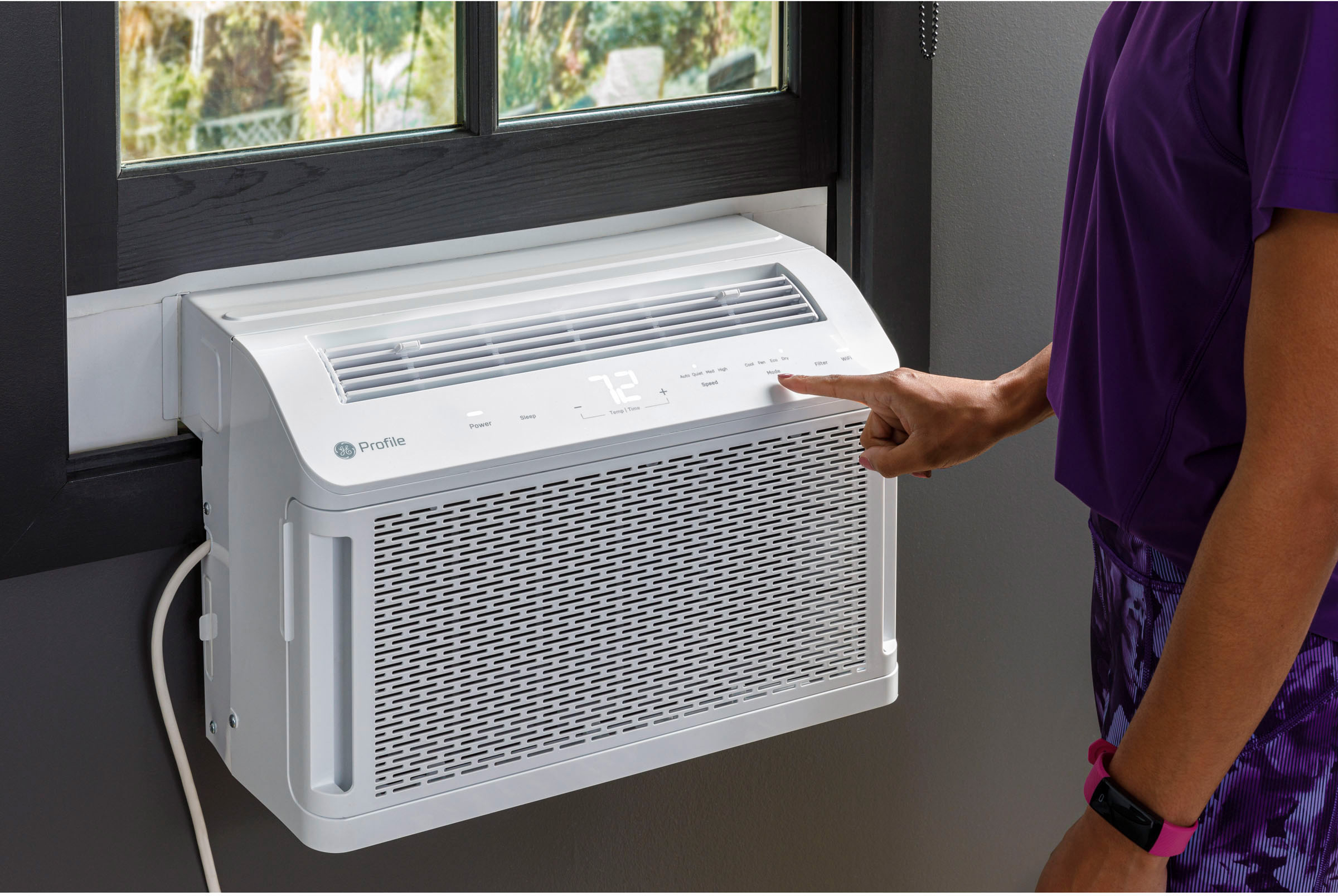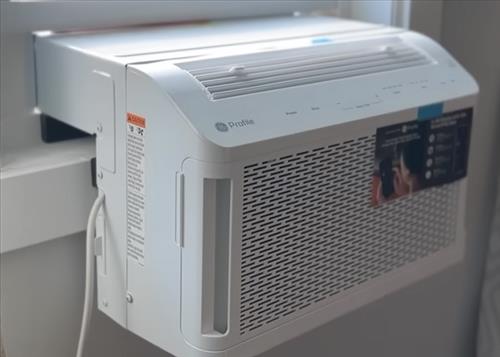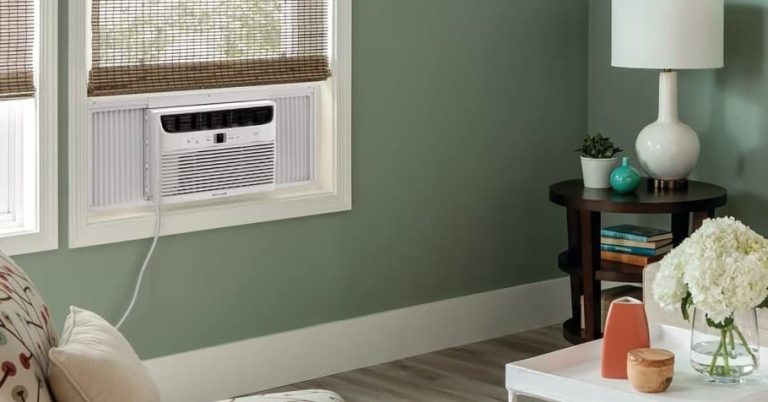Best And Most Quiet Window Air Conditioner

Frequently Asked Questions: Finding the Quietest Window Air Conditioner
Choosing a window air conditioner involves balancing cooling power with noise level. Nobody wants a unit that disrupts their peace and quiet. This FAQ addresses common concerns and offers guidance on selecting the best and most quiet window air conditioner for your needs.
Question 1: What makes a window air conditioner "quiet," and how is noise level measured?
A "quiet" window air conditioner generally operates at a lower decibel (dB) level than standard models. Decibels are the unit of measurement for sound intensity. The lower the dB rating, the quieter the unit.
Factors contributing to a unit's noise level include:
- Compressor design: More efficient and well-insulated compressors tend to generate less noise.
- Fan motor and blade design: Aerodynamic fan blades and quality motors reduce air turbulence and vibration.
- Cabinet construction: A well-built and insulated cabinet dampens vibrations and reduces sound transmission.
- Operating mode: Higher cooling speeds will generally be noisier than lower speeds or energy-saving modes.
Manufacturers typically list the dB rating on the product specifications. Look for models with dB ratings below 50 dB for quieter operation. Some are even marketed as "ultra-quiet" and fall in the 40-45 dB range.
Question 2: What features should I look for to ensure I'm getting a truly quiet window AC unit?
Beyond the dB rating, several features can contribute to a quieter cooling experience:
- Inverter Technology: Inverter ACs adjust the compressor speed to match the cooling demand, resulting in smoother, quieter operation compared to traditional on/off compressors. This also saves energy.
- Sleep Mode/Night Mode: These modes automatically reduce fan speed and noise levels during sleep.
- Noise Dampening Materials: Look for models that advertise using noise-dampening materials within the unit’s construction.
- Fan Speed Settings: More fan speed options allow you to find a balance between cooling and noise. Choose a lower fan speed when maximum cooling isn't required.
- Installation Considerations: Proper installation is crucial for minimizing noise. Ensure the unit is securely mounted in the window and use foam weather stripping to seal any gaps, which can also reduce vibration and noise.
- Consider models with Remote Controls: This offers the ability to make adjustments without approaching the unit.
Important Tip: Read customer reviews! Real-world experiences often provide valuable insights into a unit's actual noise level compared to manufacturer claims.
Question 3: How does the size of the room affect the type of quiet AC I should purchase?
Choosing the right size AC unit for your room is crucial, not only for effective cooling but also for minimizing noise. An undersized unit will have to work harder and run constantly, leading to increased noise and energy consumption. An oversized unit will cool the room too quickly and cycle on and off frequently, which can also be noisy and inefficient.
To determine the appropriate size, calculate the room's square footage and use the BTU (British Thermal Units) rating as a guide. A general rule of thumb is:
- 100-150 sq ft: 5,000 - 6,000 BTU
- 150-250 sq ft: 6,000 - 8,000 BTU
- 250-300 sq ft: 8,000 - 10,000 BTU
- 300-350 sq ft: 10,000 - 12,000 BTU
- 350-400 sq ft: 12,000 - 14,000 BTU
However, these are just guidelines. Consider factors such as:
- Sun exposure: Rooms with direct sunlight require more cooling power.
- Insulation: Poorly insulated rooms need a more powerful unit.
- Number of occupants: More people generate more heat.
- Ceiling height: Higher ceilings require more BTU.
- Heat-generating appliances: Kitchens or rooms with many electronics need more cooling.
Use online BTU calculators for a more accurate estimate.
Note: If you're unsure, it's generally better to slightly overestimate the required BTU rather than underestimate. You can always adjust the fan speed or temperature settings.
Question 4: Are there specific brands or models known for being particularly quiet?
While specific models are constantly evolving, some brands consistently receive positive reviews for their quiet operation. These brands often invest in advanced compressor technology, improved insulation, and aerodynamic fan designs.
Some brands and models often praised for quietness include:
- Midea U-Shaped Inverter Window Air Conditioner: Known for its innovative design that allows the window to still close, significantly reducing noise.
- LG Window Air Conditioners (especially Inverter models): LG's inverter technology and optimized fan designs contribute to quiet performance. Look for models with "LoDecibel" operation.
- Frigidaire Gallery Cool Connect Smart Window AC: Offers relatively quiet operation along with smart features.
- hOmeLabs Window Air Conditioner: Often praised for being affordable and reasonably quiet for its price point.
Important Tip: Always check recent product reviews and comparisons before making a purchase. Technology changes rapidly, and new, quieter models are constantly being introduced. Pay attention to reviews specifically mentioning noise levels.
Question 5: How can I minimize noise from my window AC unit after installation?
Even the quietest window AC can become noisy if not properly installed and maintained. Here are some tips to minimize noise after installation:
- Secure Mounting: Ensure the unit is firmly secured in the window frame using the provided brackets and screws. Vibration is a major source of noise.
- Weather Stripping: Seal any gaps around the unit with foam weather stripping to prevent air leaks and reduce vibration.
- Proper Drainage: Make sure the unit is properly tilted to allow condensation to drain properly. Stagnant water can contribute to noise.
- Clean the Filters Regularly: Dirty filters restrict airflow, causing the unit to work harder and louder. Clean or replace the filters as recommended by the manufacturer.
- Lubricate Moving Parts: If your unit has moving parts (e.g., fan motor), lubricate them periodically with a suitable lubricant to reduce friction and noise. Consult the owner's manual for specific instructions.
- Consider a Window AC Support Bracket: For larger, heavier units, a support bracket can provide extra stability and reduce vibration.
- Minimize Contact with Window: Ensure the unit's chassis isn't directly touching the glass window as vibrations from operation will increase noise.
Question 6: What are the advantages and disadvantages of inverter vs. non-inverter window AC units in terms of noise?
Inverter AC Units:
Advantages:
- Quieter Operation: Inverter ACs are generally much quieter than non-inverter models because the compressor speed adjusts to meet the cooling demand. This means the compressor doesn't have to run at full blast all the time, reducing noise levels.
- More Consistent Cooling: Inverter ACs provide more consistent cooling because they can fine-tune the compressor speed to maintain a stable temperature. This also reduces noise fluctuations.
- Energy Efficient: Inverter ACs are more energy-efficient than non-inverter models.
Disadvantages:
- Higher Initial Cost: Inverter ACs are typically more expensive to purchase than non-inverter models.
- More Complex Components: The more complex technology can translate into potentially higher repair cost or more difficult repairs.
Non-Inverter AC Units:
Advantages:
- Lower Initial Cost: Non-inverter ACs are more affordable to purchase than inverter models.
- Simpler Technology: The simpler design can translate to simpler repair cost or repairs.
Disadvantages:
- Noisier Operation: Non-inverter ACs tend to be noisier because the compressor cycles on and off at full speed, creating noticeable changes in sound levels.
- Less Consistent Cooling: Non-inverter ACs provide less consistent cooling as they cycle on and off.
- Less Energy Efficient: Non-inverter ACs are less energy-efficient than inverter models.
Conclusion: If a quiet operation is a top priority, inverter ACs are the better choice, despite their higher initial cost. The long-term benefits of quieter operation, more consistent cooling, and energy savings often outweigh the initial investment.
Question 7: Are there any window air conditioners that are considered "silent" or completely noiseless?
While manufacturers strive to reduce noise, it's important to be realistic. There is no such thing as a completely "silent" window air conditioner. All units produce some level of noise due to the compressor, fan, and airflow.
However, some high-end models come close to being "silent" at their lowest settings. These units often utilize advanced noise-cancellation technology and feature ultra-quiet components.
When shopping for a window air conditioner, focus on models with:
- Very low dB ratings (below 45 dB): Pay close attention to the specified dB rating.
- "Ultra-Quiet" or "Silent Mode" features: Look for models with these features, which are designed to minimize noise.
- Positive customer reviews mentioning quiet operation: Read reviews from other customers to get an idea of the unit's actual noise level.
Even with the quietest window AC, you may still hear some background noise. However, it should be minimal and not disruptive to your sleep or daily activities.
By carefully considering these factors and researching available options, you can find the best and most quiet window air conditioner to keep you cool and comfortable without the unwanted noise.










